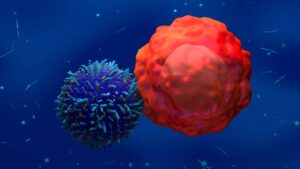Chimeric a step closer to fulfilling IPO pitch on its breakthrough cancer cell therapy

Chimeric announced new developments in its cell therapy CAR T - Getty Images
Clinical stage cell therapy company, Chimeric (ASX:CHM), has completed the planned dosing of the first patient cohort that includes four patients, to evaluate the safety dose of its Chlorotoxin CAR T (CLTX CAR T) drug in patients with recurrent or progressive glioblastoma (GBM).
GBM is an agressive cancer that occurs in the brain or spinal cord. The cancer is formed around the nerve cells, and often causes headache, nausea, and blurred vision on the patients.
This is a Phase 1 study, and aims to enroll between 18 to 36 patients with recurrent or progressive GBM across 4 dose levels. The objective is to study the safety and efficacy of CLTX CAR T, and to establish recommended dosing for a phase 2 trial.
The dosing of the four patients marks the completion in the lowest dose level of the trial. Patients in this dose cohort were dosed via single site administration, at a dose of 44 X 106 CLTX CAR T cells.
As this is a first in human phase 1 cell therapy trial, the 4 patients within this first cohort received staggered treatment, in accordance with FDA guidance.
Upon the completion of the this first cohort, the company will begin to recruit patients for the next dose level, which will introduce dual administration (a dose of 88 X 106 CAR T cells).
More about Chimeric’s CLTX CAR T therapy
The CAR T therapy has the potential to address the medical need of patients with recurrent and progressive glioblastoma.
It’s essentially a new form of immunotherapy that uses specially altered T-cells (an important component of the immune system) to directly and precisely target cancer cells.
The aim is to modify, strengthen, and program the patient’s immune system to attack the cancer cells.
The therapy utilises chlorotoxin (CLTX), derived from scorpion toxin, as the tumour-targeting component of the chimeric antigen receptor (CAR), which has been shown in preclinical models to bind more broadly and specifically to GBM cells.
In preclinical models, the company said the CLTX CAR T also demonstrated potent anti-tumor activity against glioblastoma, supporting a potentially optimal safety and efficacy profile.
Potential market
More than 300,000 patients globally are diagnosed each year with brain and nervous system cancer, and GBM is the most common and most lethal of these cancers. Only around 38% of patients with GBM survive more than one year.
The last FDA-approved therapy was in 2009, and that was for Bevacuzimab, which demonstrated no overall survival benefit.
Data from CAR T trials on the other hand, has shown that around 50% of patients who would have been expected to only survive 6 months, are alive and with no evidence of disease 4 years after being treated with a CAR T therapy.
According to Chimeric, the global market for cell therapies is estimated to reach between USD $8-9 billion by 2026. Cell therapy is the most active sector in biotech today, with financing reaching $19.9 billion in 2020, doubling from 2019.
In 2020, Chimeric licensed the exclusive global rights to the CLTX CAR T cell therapy.
Chimeric’s financials
As an early stage developer of drugs, Chimeric is yet to make any revenue. The latest half year showed that the company made a loss of $3.6 million.
The company floated its shares on the ASX at an IPO price of 20 cents a share in January, and is now trading at 31 cents.
The IPO was pitched to investors around the future potential for the CLTX CAR T cell therapy.
Chimeric share price today:
Related Topics

UNLOCK INSIGHTS
Discover the untold stories of emerging ASX stocks.
Daily news and expert analysis, it's free to subscribe.
By proceeding, you confirm you understand that we handle personal information in accordance with our Privacy Policy.








